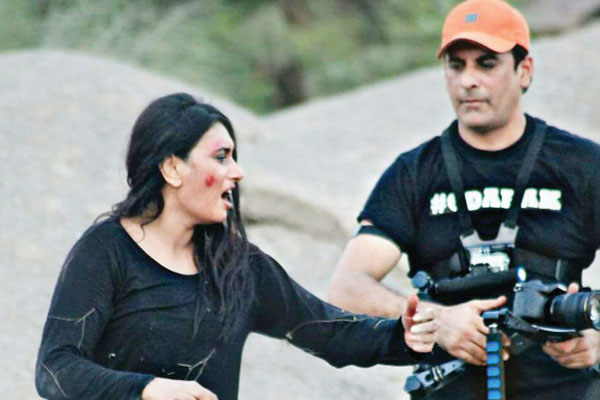As much as one would like to celebrate the revival of Pakistani cinema, it hasn’t exactly sky-rocketed in a fashion that will break the bank. The number of box office failures seem to suggest that there is a long road ahead before one can embrace this resurgence of cinema.
CINESCOPE
With three short films released as part of the series, actor-director Shamoon Abbasi reveals the concept behind the initiative and reflects on the current state of Pakistani cinema.
As much as one would like to celebrate the revival of Pakistani cinema, it hasn’t exactly sky-rocketed in a fashion that will break the bank. The number of box office failures seem to suggest that there is a long road ahead before one can embrace this resurgence of cinema.
With a ban placed on Indian content on TV and Bollywood films - with the latter now being tracked back (with the impending release of Raees and Kaabil) it is clear as day that local films aren’t strong enough to sustain the industry alone.

The brains behind 6dapack, actordirector Shamoon Abbasi, seen here with series’ co-producer Sherry Shah on the set of Mey Rahungi that features her as the protagonist.
Realizing the need for engaging cinema that is the need of the hour for the long-term, steady growth of the industry, actor-director Shamoon Abbasi has taken a slightly different route by starting an initiative through which films will be released on social media instead of cinemas.
His online film series is called 6dapaack and it aims to highlight several social issues that are both relatable and engaging. Abbasi’s reasoning is simple: investing a sizable amount of money doesn’t always guarantee a successful film and people can feel disappointed spending so much money on films they don’t end up enjoying.
“When I saw the so-called revival of cinema from 2014-2016, I noticed that hardly 5 per cent of the films were successful in terms of revenue or quality,” Abbasi noted. “They are far from being recognized on any international platform, they weren’t even catering to the masses and classes of our own country. The films were unable to engage the audience in the cinema. Bollywood films attracted masses to cinemas and generated revenue as opposed to local films, most of whom failed to do so.”
He also explained that our market does not have the potential to generate more than 4 crore rupees so there was no point of investing so much money when the return isn’t enough.
“A total of 12 crore rupees were invested in Hijrat (released last year) and it only ran for two days in cinemas,” he shared. “This takes away financers who are afraid to invest in future films.”
As far as Abbasi’s observation go, neither a big brand nor established names are able to create films that make the box office ring.
“One of the most notable TV directors Mehreen Jabbar made a film (Dobara Phir Se) but she failed; Asim Reza associated a big brand with his film (Ho Mann Jahaan) but even that couldn’t save his film from drowning. At the moment, we need real content. Content is the hero.”
Abbasi’s initiative introduced the idea of low-budget films and made them accessible to viewers online with a particular focus on screenplay. His series, 6dapack has six films in total, out of which three – Qassab, Zinda and Mey Rahungi - have already been released.
The films are written and directed by Abbasi while Sherry Shah has co-produced the films. The first film in the series, Qassab centered upon the story of Kulbhushan Yadav, an Indian national who was arrested in Balochistan, Pakistan, over espionage charges.
According to Abbasi, “Qassab got over two million views on YouTube. We received a lot of praise from Hollywood as well as India via tweets.”
The second film, Zinda revolved around the story of a martyr and released on Defense Day last year while the third in the series, Mey Rahungi, was a tribute to women around the world and highlighted the strength of a woman. The remaining three films that are in the pipeline include one called Bhook that will be based on a real life story revolving around cannibals. Another one is titled No More Malala and is about spreading education and the sixth and final one is still in the works.
Elaborating on the process of making these films, Abbasi informed, “We make these films in three days. They have everything required for a film – location, flying shots, underwater scenes, entertainment as well as strong content. As far as actors are concerned, we randomly pick up actors who are good at their work but have been neglected by the cinema lobby. Our purpose is to provide these budding actors platform to showcase their talent. We ask them to give us 2-3 hours a day and they don’t charge us anything. At the end of shooting, we reward them with a gift and a certificate of appreciation.”
This maybe an interesting angle to filmmaking but watching a film online can never truly replace the big screen experience a cinema allows. Time will tell if these six films have enough matter to create a lasting impression the way films like Moor, Manto and Shah did.